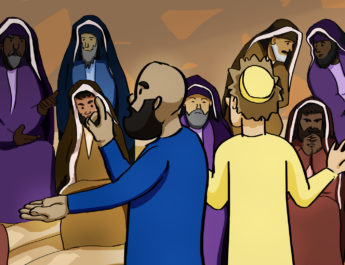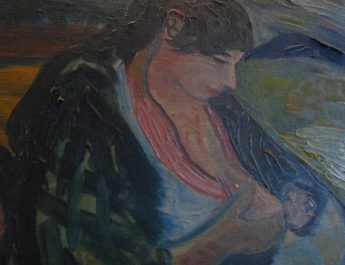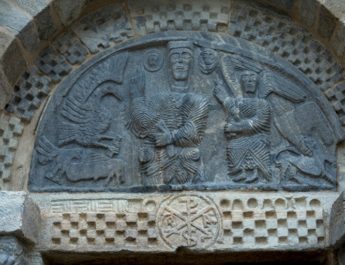Psalm 77
To the leader:I according to Jeduthun.II Of Asaph.III A Psalm.IV
I “leader” = natsach. Properly, something that glitters from a distance. So, something that stands out, excels, has status/standing (such as a chief musician or superintendent of Temple services). This can also mean to be permanent or enduring.
II “Jeduthun” = Yeduthun. 17x in OT. From yadah (to throw one’s hands into the air in a gesture of praise, to give thanks, or make a confession); from yad (hand, ability, power; hand in a literal sense; what one can do or the means by which one does it). This is Jeduthun or Yeduthun, meaning “laudatory.” He was a temple choir leader.
III “Asaph” = Asaph. From asaph (to gather, assemble, bring, take away, destroy, or remove). This is Asaph, meaning “gatherer” or “collector.” It is a personal name.
IV “Psalm” = mizmor. From zamar (making music; used specially of music to worship God; music with singing, singing praise, singing psalms); may be from zamar (to trim or prune). This is a melody or a psalm.
1 I cryV aloudVI to God,VII
aloud to God, that he may hearVIII me.
V “cry” = tsaaq. This is to cry out or call together, to shriek. It can mean, by implication, calling for an assembly.
VI “aloud” = qol. Literally, “with my voice.” This is a sound, used often for human voices. Also used when God speaks or angels, animals or instruments. It can be a cry or a noise, thunder or earthquakes and so on.
VII “God” = Elohim.
VIII “hear” = azan. Perhaps from ozen (ear, hearing, audience, show; properly, broadness – applied to its ear in reference to its shape). Properly, this is to expand or broaden one’s ear i.e. listen intently, pay attention, heed.
2 In the dayIX of my troubleX I seekXI the Lord;XII
IX “day” = yom. Root may mean being hot. This is the day in a literal or figurative sense. It can also mean birth, age, daylight, continually or other references to time.
X “trouble” = tsarah. From tsar (properly, a narrow or constricted place; figuratively, trouble, a pebble, an enemy, anguish, or distress); from tsarar (to bind, restrict, narrow, be cramped, an adversary). This is tightness, distress, affliction, trouble, or adversary.
XI “seek” = darash. This is seek, ask, inquire, care for. Generally it means following in pursuit or following as part of a search, which implies seeking or asking. Also used specially to mean worship.
XII “Lord” = Adonai. From adon (lord, master, owner); root means to rule or be sovereign. This is the actual Hebrew word for Lord used (in a different form) of humans and (in the present form) of God. It means someone who is in control.
in the nightXIII my handXIV is stretched outXV without wearying;XVI
my soulXVII refuses to be comforted.XVIII
XIII “night” = layil. Properly, this refers to light twisting away. It is used for night or midnight. Figuratively, this can mean adversity.
XIV “hand” = yad. Related to “Jeduthun” in superscript. See note II above.
XV “stretched out” = nagar. 10x in OT. This is to pour, flow away, spill, run, deliver over, or stretch.
XVI “wearying” = pug. 4x in OT. This is to be faint, sluggish, grow numb, be spent.
XVII “soul” = nephesh. Related to naphash (to refresh or be refreshed). This is soul, self, person, emotion. It is a breathing creature. Can also refer to appetites and desires.
XVIII “comforted” = nacham. Properly, this is a strong breath or a sigh. This can be to be sorry, to pity, console. Comfort, or repent. But, one can also comfort oneself with less righteous thoughts, so this can also mean to avenge oneself.
3 I thinkXIX of God, and I moan;XX
I meditate,XXI and my spiritXXII faints.XXIII SelahXXIV
XIX “think” = zakar. This is to remember, to mark something so that it can be recalled, to be mindful of, to mention.
XX “moan” = hamah. This is to growl or roar, be disturbed, mourn, yearn. It is being noisy so it can imply tumult, rage, war.
XXI “meditate” = siach. From siach (musing, meditation, communication, babbling, prayer, contemplation). This is to muse, meditate, complain, sing, sigh, speak, or utter.
XXII “spirit” = ruach. This is breath, wind, air, cool, spirit. This is wind, which resembles the breath and so this can be used figuratively for life itself or being frail/mortal/impermanent. It can refer to the air of the sky or the spirit.
XXIII “faints” = ataph. 16x in OT. This is to turn, faint, hide, be overwhelmed, cover, fail.
XXIV “Selah” = selah. From salal (to lift up, build, pile, extol, exalt; can also be used for opposing as a dam holds back water). This is to lift up or exalt. Also, “selah” in the psalms where its precise meaning is uncertain. It could be a pause in the music, a moment of silence. It could signal a change in the service or mean something akin to amen.
4 You keep my eyelidsXXV from closing;XXVI
I am so troubledXXVII that I cannot speak.XXVIII
XXV “eyelids” = shemurah + ayin. Shemurah is 1x in OT. From shamar (to keep, watch, or preserve; to guard something or to protect it as a thorny hedge protects something). This is something that guards. It could be an eyelid or waking. Ayin is eye in a literal or figurative sense so eye, appearance, favor, or a fountain (the eye of the landscape).
XXVI “keep…from closing” = achaz. This is to grasp, catch, seize, take and hold in possession. It can also be to be afraid or hold back.
XXVII “am so troubled” = paam. 5x in OT– including Pharaoh’s reaction to his dream in Genesis 41 & Nebuchadnezzar’s reaction to his dream in Daniel 2. This is to move, trouble, to tap in a regular rhythm, to agitate.
XXVIII “speak” = dabar. This is generally to speak, answer, declare, or command. It might mean to arrange and so to speak in a figurative sense as arranging words.
5 I considerXXIX the days of old,XXX
and remember the years of long ago.XXXI
XXIX “consider” = chashab. This is properly to braid or interpenetrate. Literally it is to create or to wear. Figuratively, it can mean plotting – generally in a negative sense. More broadly, this can also mean think, consider, or make account of.
XXX “old” = qedem. Perhaps from qadam (to come in front or be in front; to meet, anticipate, confront, receive, or rise; sometimes to meet for help). This is front, formerly, before, east, eternal, everlasting, antiquity.
XXXI “long ago” = olam. This is a long scope of time whether in the past (antiquity, ancient time) or in the future (eternal, everlasting).
6 I communeXXXII with my heartXXXIII in the night;
I meditate and searchXXXIV my spirit:
XXXII “commune” = zakar + neginah. Literally, “I remember my song.” Zakar is the same as “think” in v3. See note XIX above. Neginah is 13x in OT. From nagan (to strike a stringed instrument, to pluck or play it). This is music, a song, a taunt, or a stringed instrument. It can also be a poem given a musical setting.
XXXIII “heart” = lebab. May be related to labab (to encourage; properly, to be encased as with fat; used in a good sense, this means to transport someone with love; used in a bad sense, it can mean to dull one’s senses). This is the heart, courage, one’s inner self, the mind, or the will. Heart is only used in a figurative sense in the Old and New Testaments.
XXXIV “search” = chaphas. This is to seek. In a causative sense, it can mean to hide or disguise oneself.
7 “Will the Lord spurnXXXV forever,XXXVI
and never againXXXVII be favorable?XXXVIII
XXXV “spurn” = zanach. This is to cast aside, reject, remove, forsake.
XXXVI “forever” = olam. Same as “long ago” in v5. See note XXXI above.
XXXVII “again” = yasaph. This is to add, increase, continue, exceed.
XXXVIII “be favorable” = ratsah. This is to be pleased with, delight, take pleasure in, or accept with favor. It can mean to approve or consent regarding something. It can also be used specifically of satisfying debts or being pardoned.
8 Has his steadfast loveXXXIX ceasedXL forever?XLI
XXXIX “steadfast love” = chesed. From chasad (being good, kind, merciful; may mean bowing one’s neck as is done in the presence of an equal for courtesy’s sake; so, if one in a superior position is treating you like an equal, that is what is captured here). This is favor, goodness, kindness, loving kindness, pity, reproach, or a good deed. When done by God to humanity, this is mercy/loving kindness. When done by humanity to God, it is piety.
XL “ceased” = aphes. 5x in OT. This is to finish, fail, stop, come to nothing, disappear.
XLI “forever” = netsach. Related to “leader” in superscript. From natsach (see note I above). This is properly a goal or destination as the bright focus to which one journeys. It can be splendor, truthfulness, or confidence. Most often, it refers to everlastingness, always, continually.
Are his promisesXLII at an endXLIII for all time?XLIV
XLII “promises” = omer. 6x in OT. From emer (speech, thing, utterance, promise, argument, command); from amar (to speak, say, answer, command, promise, report). This is speech, a word, a matter, or a promise.
XLIII “are…at an end” = gamar. 5x in OT. This is to end, perfect, or accomplish. It could be end as to complete or end as a failure.
XLIV “for all time” = dor + dor. Literally, “to generation and generation.” From dur (to move in a circle, which implies living somewhere or remaining there; it can also be the sense of piling or heaping up). This is a revolution of time, which is to say, an age or generation. It can also be a dwelling or one’s posterity.
9 Has GodXLV forgottenXLVI to be gracious?XLVII
XLV “God” = El. Related to “God” in v1. See note VII above.
XLVI “forgotten” = shakach. This is to forget because of not remembering something or not paying attention to it. It can also mean to mislay.
XLVII “be gracious” = channot. 1x in OT. From chanan (beseech, show favor, be gracious; properly, to bend in kindness to someone with less status). This is supplication, be gracious.
Has he in angerXLVIII shut upXLIX his compassion?”L Selah
XLVIII “anger” = aph. From anaph (to be angry; properly, breathing hard as a signifier of being enraged). This properly refers to the nose or nostril and by extension the face. It can specifically refer to anger or wrath as one breathes hard and nostrils flare in times of great anger.
XLIX “shut up” = qaphats. 7x in OT. This is to close, shut, contract. It can be used of hand or mouth, withdrawing compassion, or the way one contracts in death. It can also mean leaping as the body contracts over and over.
L “compassion” = racham. From the same as rechem (womb); from racham (to love, have compassion, have mercy); from racham (compassion, tender love, womb, compassion; the womb as that which cherishes the fetus). This is compassion, mercy, or tender love.
10 And I say, “It is my griefLI
that the right handLII of the Most HighLIII has changed.”LIV
LI “grief” = chalah. Properly, this is to be worn; hence, being weak, sick, or afflicted. It can also mean to grieve or, positively, to flatter or entreat.
LII “right hand” = yamin. May be from yamam (to go or choose the right, use the right hand; to be physically fit or firm). This can mean right hand, right side, or south. Since most people are right-handed, the metaphorical usage of this word presumes that the right hand is stronger and more agile. Thus, it is the instrument of power and action.
LIII “Most High” = Elyon. From alah (to go up, ascend, be high, be a priority; to arise in a literal or figurative sense). This is most high, upper. It refers to elevation – so, lofty.
LIV “changed” = shanah. Literally, “the years.”
11 I will call to mindLV the deedsLVI of the Lord;LVII
I will rememberLVIII your wondersLIX of old.
LV “call to mind” = zakar. Same as “think” in v3. See note XIX above.
LVI “deeds” = maalal. From alal (to affect, do, practice, mock, overdo, glean, abuse, pain). This is some kind of deed, action, invention or practice whether good or bad.
LVII “Lord” = Yah. From YHVH (proper name of the God of Israel; God, Lord; the self-existent or eternal one); from havah (to become) or hayah (to be, become, happen)}. This is Lord or God – a shortened form of God’s most holy name.
LVIII “remember” = zakar. Same as “think” in v3. See note XIX above.
LIX “wonders” = pele. 13x in OT. This is a wonder, marvelous thing, or a miracle.
12 I will meditateLX on all your work,LXI
and museLXII on your mighty deeds.LXIII
LX “meditate” = hagah. This is to speak, declare, make a sound, imagine, or mutter. It could be a murmur, moan, or growl, whether from delight or anger. It can also mean to study, ponder, or meditate.
LXI “work” = poal. From paal (to do, make, work, or accomplish; generally refers to regularly repeated or systematic action – to practice). This is an action or deed, conduct. It is the act of working or the work itself. It can also be wages or maker.
LXII “muse” = siach. Same as “meditate” in v3. See note XXI above.
LXIII “mighty deeds” = alilah. Related to “deeds” in v11. From alal (see note LVI above). This is a deed or action – something that causes an effect. It could be a wanton or shameful deed or an opportunity.
13 Your way,LXIV O God,LXV is holy.LXVI
What godLXVII is so greatLXVIII as our God?LXIX
LXIV “way” = derek. From darak (to tread, march, to walk. Can also mean affixing a string to a box since one needs to step on it to bend it in the process; so also an archer). This is a road as a thing that is walked on. Can be used figuratively for the path that one’s life takes or how one chooses to live one’s life.
LXV “God” = Elohim. Same as “God” in v1. See note VII above.
LXVI “holy” = qodesh. This is set apart and so sacred. God is different from us and so God is holy/set apart. Things we dedicate to God’s service are set apart for God and so they, too, are holy, etc.
LXVII “god” = el. Same as “God” in v9. See note XLV above.
LXVIII “so great” = gadol. From gadal (to grow up, become great, become wealthy – to advance. The root meaning may be to twist in the sense of the process of growing). This is great, high, bigger, noble, old, marvelous. It can also refer to someone who is powerful or distinguished.
LXIX “God” = Elohim. Same as “God” in v1. See note VII above.
14 You are the GodLXX who worksLXXI wonders;
you have displayedLXXII your mightLXXIII among the peoples.LXXIV
LXX “God” = El. Same as “God” in v9. See note XLV above.
LXXI “works” = asah. This is to make, do, act, appoint, become in many senses.
LXXII “displayed” = yada. Literally, “made known.” This is to know, acknowledge, advise, answer, be aware, be acquainted with. Properly, this is to figure something out by seeing. It includes ideas of observation, recognition, and care about something. It can be used causatively for instruction, designation, and punishment.
LXXIII “might” = oz. From azaz (to be strong, become fixed, be bold, prevail, be impudent; it means to be stout literally or figuratively. A Late Hebrew word). This is strength in the sense of force, majesty, praise, material and physical strength, the abstract notion of security. It can also speak of social or political power.
LXXIV “peoples” = am. From amam (to darken, hide, associate; creating shadows by huddling together). This is people or nation. It can be used specifically for a tribe, collectively of troops or armies, or figuratively to refer to a flock of animals.
15 With your strong armLXXV you redeemedLXXVI your people,
the descendantsLXXVII of JacobLXXVIII and Joseph.LXXIX Selah
LXXV “arm” = zeroa. Perhaps from zara (to sow, scatter seed, conceive). This is the arm, shoulder, or foreleg of an animal. It is figuratively used for power, force, might, or help.
LXXVI “redeemed” = gaal. This is to redeem someone or something according to kinship laws. So, it could be acting on a relative’s behalf to buy back their property, to marry one’s brother’s widow, etc. This could be more briefly translated as to redeem, acts as kinsman, or purchase. As a noun, it could be deliverer or avenger.
LXXVII “descendants” = ben. From banah (to build or obtain children). This is son, age, child. It is son in a literal or figurative sense.
LXXVIII “Jacob” = Yaaqob. From the same as aqeb (heel, hind part, hoof, rear guard of an army, one who lies in wait, usurper). This is Isaac’s son and his descendants. The name means heel-catcher or supplanter.
LXXIX “Joseph” = Yoseph. Related to “again” in v7. From yasaph (see note XXXVII above). This is Joseph, meaning “he increases” or “let him add.”
16 When the watersLXXX sawLXXXI you, O God,LXXXII
when the waters saw you, they were afraid;LXXXIII
the very deepLXXXIV trembled.LXXXV
LXXXIII “were afraid” = chul. This is whirling around so dancing as in a circle or writhing in pain. It is used particularly for the pain of childbirth or from writhing due to fear. It can also be falling in pain or waiting.
LXXXIV “deep” = tehom. Perhaps from hum (to roar, murmur, cause an uproar, agitate; to defeat in battle, destroy). This is the deep or the abyss. Either understood as a formless empty place of nothingness or as a place of confusion filled with water – the deep the feeds the waters of the earth.
LXXXV “trembled” = ragaz. This is shaking from any strong emotion, particularly anger or fear. It can be agitated, excited, perturbed, afraid, quaking, quivering.
17 The cloudsLXXXVI poured outLXXXVII water;
the skiesLXXXVIII thundered;LXXXIX
your arrowsXC flashed on every side.XCI
LXXXVI “clouds” = ab. Perhaps from uwb (to be a think or dark cloud, a cloud covering). This is a dark or thick cloud that can envelope in darkness. It can also refer to a copse or to clay.
LXXXVII “poured out” = zaram. 2x in OT. This is to flood, pour. It is to carry something off as a flood does.
LXXXVIII “skies” = shachaq. From shachaq (to rub off, wear away, pulverize). This is powder, dust, vapor. It can also refer to the sky or a cloud.
LXXXIX “thundered” = qol + natan. Literally, “gave a sound.” Qol is the same as “aloud” in v1. See note VI above. Natan is to give, put, set, offer. It is to give literally or figuratively.
XC “arrows” = chatsats. 3x in OT. From chatsats (to divide, chop, pierce, distribute, shoot an arrow, an archer). This is something that cuts or is cut. So, it can be gravel or an arrow.
XCI “flashed on every side” = halak. This is go, come, walk. It is walk literally and figuratively and includes people and animals. It can be used figuratively for one’s moral life – how we walk according to God’s way or against it. It can also refer to the walk of life as in the course one’s life takes, the choices we make, etc.
18 The crashXCII of your thunderXCIII was in the whirlwind;XCIV
XCII “crash” = qol. Same as “aloud” in v1. See note VI above.
XCIII “thunder” = raam. 6x in OT. Perhaps from raam (to trouble, be agitated, irritated, angered; a peal of thunder). This is thunder (the noun).
XCIV “whirlwind” = galgal. 11x in OT. From galal (to roll, roll away, wallow, commit, remove; rolling in a literal or figurative sense). This is wheel, wagon, whirl, whirlwind; something that rolls.
your lightningsXCV lit upXCVI the world;XCVII
the earthXCVIII trembled and shook.XCIX
XCV “lightnings” = baraq. From baraq (to flash, a flash of lightning). This is lightning. Figuratively, it could be a gleaming or glittering. Concretely, it could be a flashing sword.
XCVI “lit up” = or. This is to light, shine, set on fire – to be luminous in a literal or figurative sense.
XCVII “world” = tebel. From yabal (to lead, bring, carry, conduct; properly, to flow; to bring or lead with fanfare). This is world, confusion, inhabited part of the earth, but also used for the whole world.
XCVIII “earth” = erets. Root may mean to be firm. This is earth, ground, field land, or country.
XCIX “shook” = raash. This is to quake, shake, tremble, shake from fear; leap like a locust.
19 Your way was through the sea,C
your path,CI through the mightyCII waters;
yet your footprintsCIII were unseen.CIV
C “sea” = yam. Root may mean to roar. This is the sea, often referring to the Mediterranean. It comes from the root in the sense of the roar of crashing surf. This word is sometimes used for rivers or other sources of water. It can mean to the west or to the south.
CI “path” = shebil. 2x in OT. From the same as shobel (the train of a skirt that flows after a woman). This is a path or track as something that flows.
CII “mighty” = rab. From rabab (increasing in any aspect whether quantity, authority, size, quality, greatness, etc.). This is abundance, many, elder, exceedingly, great. It refers to abundance of amount, rank, or status.
CIII “footprints” = aqeb. Related to “Jacob” in v15. 13x in OT. See note LXXVIII above.
CIV “was unseen” = lo + yada. Literally, “not known.” Yada is the same as “displayed” in v14. See note LXXII above.
20 You ledCV your people like a flockCVI
by the hand of MosesCVII and Aaron.CVIII
CV “led” = nachah. This is lead, guide, or bring. It can be used for transporting into exile or coming in as colonists. This is the word used in Psalm 23 “he leads me in the paths of righteousness.”
CVI “flock” = tson. This is a flock of sheep and goats.
CVII “Moses” = Mosheh. From mashah (to pull out in a literal or figurative sense, to draw out) OR from Egyptian mes or mesu (child, son i.e. child of…). This is Moses – the one drawn out from the water, which is to say, rescued. If derived from the Egyptian, his name would share a root with Rameses and Thutmose.
CVIII “Aaron” = Aharon. Derivation uncertain. May mean “bearer of martyrs” OR be related to Ancient Egyptian ꜥḥꜣ rw (warrior lion) OR elevated, exalted, high mountain. This is Aaron. Seehttps://en.wiktionary.org/wiki/Aaron
Image credit: “Moses and the Red Sea” by René Pfitzner.




